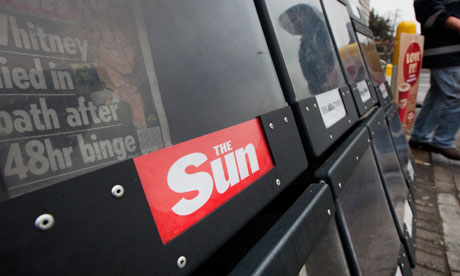The Sun arrests show that this is a situation that's out of News International's control – and it sounds angry and fearful

There are concerns among News International staff that the Sun will go the same way as its former sister paper, the News of the World. Photograph: David Levene for the Guardian
Just before Christmas Richard Caseby, the managing editor of the Sun, banged out a jeering email to the Guardian. Police had recently started arresting their own officers over unauthorised leaks.
The aggression and lack of sympathy were typical of the tabloid's attacking style. Notable too was the poor grip on the facts. The arrests had nothing to do with Hill, one of the Guardian's reporters who has helped expose phone hacking, nor anyone else at the paper.
There were no more sneers from Caseby at the weekend. It transpired that it was in fact the Sun and Caseby's own staff who are the central target of large-scale the police attention over corruption allegations.
Jeering appears to have been replaced this week by trepidation and anger at Wapping, and real fear that Rupert Murdoch will decide to shut the Sun as he did its former sister paper the News of the World – one paper hopelessly tainted by phone hacking, the other threatened by allegations of bribery.
The "journos", as Murdoch would call them, are complaining of a "witch-hunt" following widespread arrests. But events in two directions have now gone out of their control. Both the police and their own US parent company, News Corporation, have their own agendas.
Already, former senior officers, such as former assistant commissioner John Yates, are preparing lengthy witness statements to try and explain why they never pursued Murdoch's papers vigorously enough in the past.
Last week the police endured a spectacular humiliation. The only way they could end lawsuits by hacking victims – including former ministers John Prescott and Chris Bryant, and the former senior Metropolitan police officer Brian Paddick – was to make a formal courtroom admission of previous failure.
The last thing the Met's new commissioner, Bernard Hogan-Howe, will want is to face any more accusations at Leveson of police doing too little. He can probably live at present with complaints from the tabloids that the police are doing too much.
Last Saturday, following information passed to the British police by Murdoch's own New York-controlled management committee, five senior Sun figures from the deputy editor downwards were raided at dawn.
They were faced with indignities including, according to one protesting colleague yesterday, searches of his children's underwear drawer.
They were questioned at police stations before being released on bail. At least 10 Sun journalists have now been arrested over corruption allegations, while an 11th senior reporter has, according to police, gone abroad and remains wanted for questioning.
But the Sun's journalists are being treated like "an organised gang", Trevor Kavanagh, the paper's associate editor, complained in a column on Monday. He claimed the Sun's closure "would be a catastrophe for the British media".
But Kavanagh's lengthy column managed to avoid naming to the Sun's readers a potential offence among those being investigated – bribery of police officers.
He also wrote very guardedly of the behaviour of his own senior executives, who have deliberately unearthed and handed over all relevant emails and expense records to the police. He called this a "sensitive domestic issue within the News International family".
Kavanagh, speaking to Radio 4, called this attitude "appalling" and said it was "resented deeply and bitterly" by his colleagues. In his column he claimed that although he understood why Murdoch needed to protect his US corporate reputation, "some of the greatest legends in Fleet Street have been held, at least on the basis of evidence so far revealed, for simply doing their jobs as journalists on behalf of the company".
The fact Kavanagh omitted, however, was that Murdoch has very little choice about throwing misbehaving Brits off the sledge if he really wants to protect the US parent company. The recent high court ruling by Mr Justice Vos, in lawsuits by other hacking victims, specifically pointed to evidence, described in part as "compelling", that Murdoch's directors may have been involved in a cover-up and destruction of evidence.
As part of its settlement of 37 hacking cases on 19 January, News International admitted, for the purposes of assessing damages, that senior employees and directors of News Group – the company which ran the Sun and News of the World – had lied to the police and destroyed evidence, including emails and journalists' computers.
It is this trail of deception and cover-ups by senior Murdoch executives and directors that may explain why the police have had to take on large numbers of extra officers and why they would be reluctant to tip off NI journalists about any arrests or interviews under caution. James Murdoch, Rupert's son, has been reduced to explaining he never read incriminating emails.
This has implications in the US. If the Department of Justice in Washington opens a corruption investigation against News Corp, the company's most effective tactic is now to bring in outside lawyers, visibly co-operate with law enforcement, and hope to reduce any eventual fine to manageable proportions. That will be the normal advice the MSC would get from Klein and his fellow New York attorneys.
http://www.guardian.co.uk/media/2012/feb/13/sun-arrests-news-international-met-police?INTCMP=SRCH
